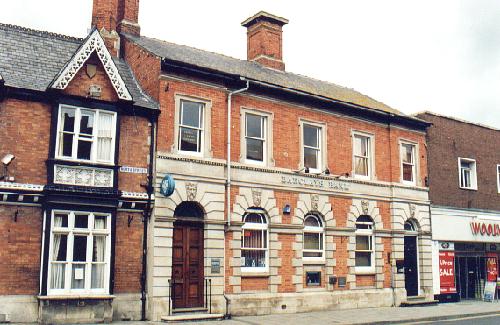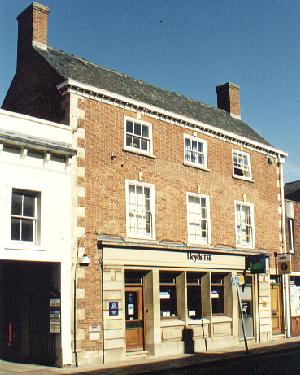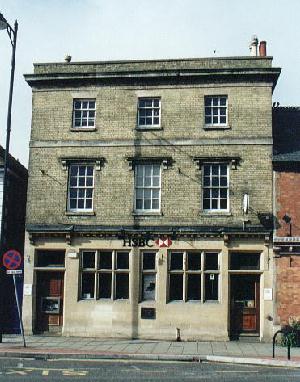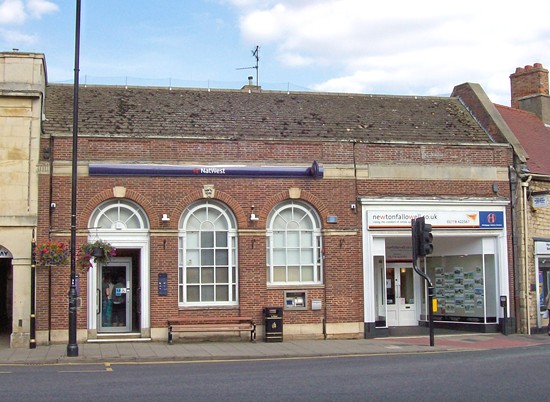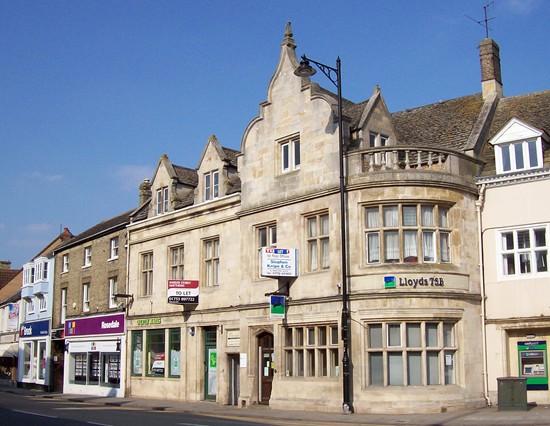|
Banking in Bourne
By far the oldest bank to operate in Bourne was the Stamford, Spalding and Boston Banking Company, formed as the Stamford Bank in the mid-18th century and becoming the Stamford and Rutland Bank in 1800. It eventually embraced other towns in South Lincolnshire, including Bourne, and in 1891 it was using accommodation provided by the Angel Hotel and the Greyhound Inn at Folkingham, open on market days. The company continued to grow and had 38 branches throughout the county by 1911 when it was taken over by Barclays Bank, operating from premises in North Street (pictured above) that are still in use today. Bank notes issued by the company survive and are prized by collectors, fetching high prices at auction, and examples can be seen in Stamford Museum. The main banks were used by businesses and the wealthier citizens but during the early years of the 19th century those of lesser means who wished to leave money on deposit were able to use a savings bank which was run by a local board of trustees and operating for an hour on Saturdays from the Town Hall although this arrangement was far from successful and the Stamford Mercury reported on Friday 9th November 1849 that depositors had made angry complaints.
"The place selected for the transaction of business is the Town
Hall", said the report, "and on the day of the magistrates' meetings, the
depositors with their little cash are subject to every species of annoyance,
by having to mix with parties of questionable character attending such
meetings. The hour selected for business is from one to two. Within the last
month, the Rev Joseph Dodsworth [curate] was the appointed manager of the day:
he never made his appearance. Mr William Bell [a local solicitor], the
well-paid actuary, was also absent; and after waiting for an hour, the
depositors were honoured with an interview to pay their cash to an
irresponsible individual in the person of a clerk from the office
of Mr Bell. Surely this state of things cannot be right; and as the financial
accounts of all savings banks must be made up on the 20th inst. and
transmitted to government, it is hoped the trustees and managers of this and
similar institutions will do their duty and afford to the industrious classes
of Her Majesty's subjects that security and satisfaction to which they are
justly entitled." "One of those very useful institutions, a Penny Savings Bank, has just been established in this place and it promises, from the support it has already received and the interest in it awakened amongst those for whose benefit it is intended, to be extensively used in this district. There can be no doubt that amongst the poorer classes, many small sums which in time of sickness or scarcity of work would be most useful, are often inconsiderately wasted and it is in order that an opportunity may be afforded for the saving of these sums that penny savings banks are being now so widely established.
"With such an object in view, we heartily wish them success and more particularly this, the first, we believe, established in the neighbourhood. Already, with only short notice given and but three weeks' trial, it numbers above a hundred members with every probability of a huge and speedy increase and of its being found conveniently useful not merely as regards the money that may be saved but also in inducing careful habits which, to the young especially, may be of great service in after years. The rules, which are few and simple, can be obtained on application to the secretaries, Mr [Robert Mason] Mills or Mr Sang, by whom any further information will be cheerfully afforded."
The bank was an immediate success and the first annual report, issued in October 1859, revealed that £130 16s. 8d. had been received in small sums from 300 depositors. The amount withdrawn amounted to £50 18s. 7d. leaving £70 18s. 1d. due to depositors. The report added:
The treasurer and secretaries of this institution act gratuitously. No interest is added to the accounts of depositors. The funds are placed in the Bourn Savings Bank where there stood at the close of the account to the credit of the Penny Bank, including interest, the sum of £70 13s. 7d. and 18s. 3d. in the hands of the treasurer. The preliminary expenses were light, the greater part of which was raised by subscription at the opening of the Bank, so that notwithstanding the expense incurred at the formation of the institution, there remains a slightly larger amount of funds available for the purpose of the Penny Bank than is due to the depositors. Commencing with 34 depositors, and at the close of the year numbering 300, the managers of the Bank have much reason to be gratified at the measure of success which has attended their efforts during the first year and it is hoped that its usefulness will become more and more apparent. Many of the amounts withdrawn from time to time by depositors have been lodged in the Bourn Savings Bank, thus showing that the Penny Bank adds to the number of depositors in the other. The managers trust that the primary object that they had in view in establishing this Bank, namely, the encouragement of careful and provident habits among the working classes, has to a considerable extent been realised and will, as its usefulness becomes better known, be more fully developed.
Within seven years of opening, the bank had 723 members and deposits were averaging £100 a year, totalling £816 18s. 6d. by December 1865. This was a forerunner of the present Trustee Savings Bank, founded in the 19th century, and was for many years located in the Town Hall, opening only once a week on Saturday afternoons. The Trustee Savings Bank eventually moved to premises at No 6 West Street in 1955, one of the oldest houses in the town that dates back to the early 17th century and once a handsome and impressive town house occupied by one of Bourne's more affluent citizens. The building had previously been used as offices by several public organisations including Bourne Rural District Council, Bourne's Board of Guardians, the county court and several local drainage boards but it had been standing empty for some years and had become so neglected that there were fears for its future but the extensive alterations were carried out to transform it into a modern bank with comfortable offices and counter services and a commercial facade built of stone was installed on the red brick frontage. At the time of the move to West Street, the bank was part of the East Midlands Trustee Savings Bank and the new premises were officially opened by the Earl of Ancaster on Tuesday 14th June 1955 when he formally unlocked the building with a ceremonial key. At that time, there were 1,536 depositors with £212,000 standing to their credit. By 1962, deposits had passed half a million pounds and a lunch was held at the Burghley Arms to mark the milestone, the chairman, Mr Horace Stanton, presiding. The Earl of Ancaster, who was also present, told guests that they now had £530,000 and 3,276 accounts. Since then, the bank has expanded considerably and is now part of Lloyds TSB but the West Street premises were closed in March 2005 and all business transferred to the bank's other branch in the town centre while the the premises were later converted for use as offices and shops. The first Post Office opened in Bourne soon after the introduction of the penny post in 1840 and was situated in Abbey Road, on the site of the present Corn Exchange building, to cope with the increasing volume of mail under the supervision of the postmaster, Mr Towns Gatliffe. In 1861, a branch of the Post Office Savings Bank was opened on the premises and soon became popular, the advantage being that deposits could be made every working day from 9 a m until 6 p m and an hour later on Saturdays, thus persons having business to transact could do so far more conveniently than at the traditional banks which operated less favourable hours, the only drawback being that they did not accept sums smaller than one shilling. The POSB, as it soon became known, was eventually the most popular people's bank in the country and still operates today, although in a greatly revised form. Another of Bourne's old established banks was Peacock, Handley & Company and by the early 1900s, there was also a branch of the Lincoln and Lindsey Bank.
The three-floor, yellow brick Regency building at No 3 North Street was used as shop premises before it was converted into a bank. Among those who traded from here were Harrison's the drapers in the mid-19th century followed by the haberdashers Oates and Musson who often displayed their goods under a large canvas awning that protruded over the pavement. The premises became the local branch of the Midland Bank during the early years of the 20th century, the shop front being replaced by a stone façade typical of such financial institutions, and in 1992, the main bank was taken over by the Hong Kong and Shanghai Banking Corporation, the world's biggest banking conglomerate, and became one of its 6,000 offices in 81 countries. It remains part of that bank today although in the interests of public relations and to pacify those customers who abhor the thought of their finances being in the hands of the Chinese, it is known simply by the initials HSBC.
See also Breaking the bank REVISED APRIL 2014
Go to: Main Index Villages Index |
||||||||||
